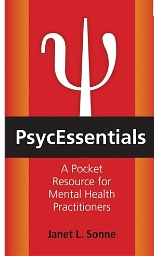PsycEssentials: A Pocket Resource for Mental Health Practitioners

“PsycEssentials: A Pocket Resource for Mental Health Practitioners”
By Janet L. Sonne
American Psychological Association
Washington, D.C., 2012
Indispensable go-to-guide is user friendly
Reviewed by James K. Luiselli, Ed.D., ABPP, BCBA-D
Professional, pocket-size reference books have become popular over the years, particularly in medicine and psychology. “PsycEssentials” is one such book, in the author’s words, intended to “gather a broad range of information that clinicians commonly need and use in their practices and present it in a simple, clear, user-friendly format for quick reference.” Published by the American Psychological Association, the book is reasonably priced and also available in e-book and app formats.
A clinical psychologist, Janet L. Sonne constructed the book to reflect the “typical chronological process with a client,” starting from initial assessment through diagnostic formulation, treatment and termination. All of the 18 chapters feature a similar format that begins with a brief introduction followed by an outline germane to the topic at hand and concluding with a respective reference list. Although some of the chapters have narrative subheadings, most of them qualify as easily accessible checklists.
The book does not have distinct section headings but the chapters fall loosely under several general categories. Beginning with the process of initial assessment, there are chapters devoted to conducting interviews, diagnostic screening and a mental status examination. The assessment theme continues with a section that includes chapters about standardized instruments, self-harm, offending behavior and risk evaluation. The next section, comprised of three chapters, deals with a clinician’s legal responsibilities such as mandated reporting and duty to protect – kudos to Sonne for providing several tables of state-by-state regulatory telephone numbers and web resources!
Concerning treatment, there is a section on evidence-based interventions, pharmacotherapy and the matter of terminating services with a client. For clinicians who have limited knowledge about psychopharmacology, the details of common psychotropic medications, indications, recommended dose and side effects will be particularly informative.
The book concludes with guidelines for documenting and maintaining records plus a valuable compilation of Internet contacts for national professional organizations, state licensing boards and discipline-specific ethics codes. Additional chapters offer the clinician self-help publication resources to manage situations such as responding to a malpractice complaint, receiving a subpoena, mediating threat from clients and obtaining liability insurance.
This book is a most welcome practitioner guide, easy to use and contemporary in its orientation and approach. True to its purpose, you can look up answers to many of the questions that arise in day-to-day practice – as such I recommend it enthusiastically to novice professionals. The book also points you in the right direction to gather additional information about a specific concern or inquiry that may not have been addressed completely. I suggest further that experienced clinicians consider the book because it is current and references seminal practice and research material that should not be overlooked. I plan on having “PsycEssentials” close at hand, and you should too, as a reliable and indispensable go-to guide.
James K. Luiselli, Ed.D., ABPP, BCBA, is senior vice president, applied research, clinical training and peer review at the May Institute in Norwood, Mass.
Learn more about the book: Psycessentials: A Pocket Resource for Mental Health Practitioners
